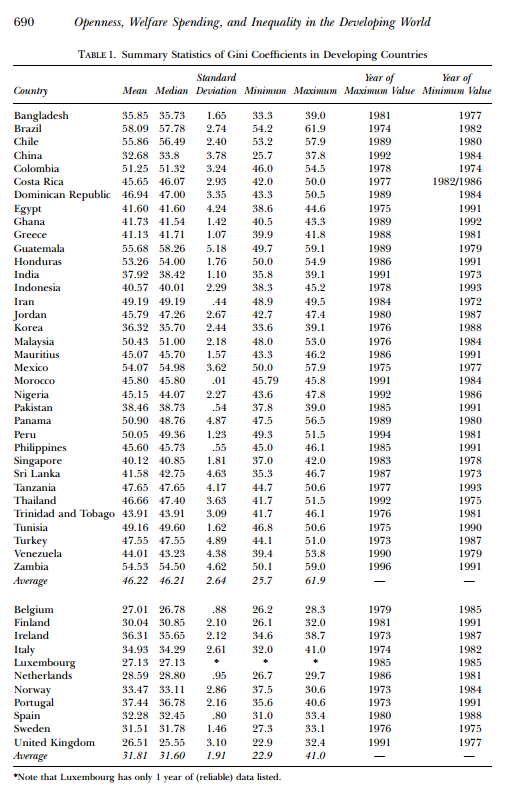Below is a table (Table 1) from Rudra (2004).
Do you notice anything strange about these Gini-coefficients? Hint: to verify inequality data, I always look at the country I know best, to see if data make sense...
[I will update this post with my thoughts eventually]
Clearly, something is wrong with the data regarding Sweden in the 1970s. The table suggests that inequality in Sweden was at its lowest level in 1975 (at 27.3) and at its highest level just a year later, in 1976 (33.1). In a country like Sweden, inequality never jumps that much from one year to another, and for sure not in 1976. Reexamining the Deininger and Squire database, it turns out that the 1975 value comes from the LIS database, whereas the 1976 value is taken from Statistics Sweden. Most likely, the latter includes capital income and the former does not. Checking other figures reveals that mosty data for Sweden are net household income, but for Brazil gross income is used, and for China the unit is the individual, not the household.
Rudra is not alone. In fact, she is better than many other papers because the inclusion of a table like Table 1 above means that the errors are possible to spot by reading the paper closely. Often, D&S data are just added to the analysis without even a simple visual inspection, which means that the analysis uses incomparable Ginis.
One of the biggest benefits of Solt's Swiid, is that all Ginis are converted to the same typ (LIS-standard), and mistakes like these are avoided.
References:
Jenkins, Stephen P. 2015. "World Income Inequality Databases: An Assessment of Wiid and Swiid." Journal of Economic Inequality 13(4):629–71.
Rudra, N. 2004. "Openness, Welfare Spending, and Inequality in the Developing World." International Studies Quarterly 48(3):683-709. doi: 10.1111/j.0020-8833.2004.00320.x.
Solt, Frederick. 2016. "On the Assessment and Use of Cross-National Income Inequality Datasets." Journal of Economic Inequality (forthcoming).




